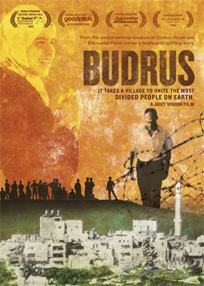Budrus is a small Palestinian town with a population of 1500 just a few miles east of the West Bank Barrier. Generations of men, women and children have made a meager living there planting and growing vast lands of fertile olive trees. They are obviously connected to the land economically, but the trees take on a deeper meaning in the social and spiritual ways the people relate through them, in relationships built on sustaining the crops; they're hard-working farmers that will only benefit relationally as they trust the work to one another and reap the land. Olives and its oil are their life, their livelihood, their connection to the ground and to each other. To threaten the trees or take the land would bring ruin to the bulk of these families.
In 2004, the Israel army, apparently in need of better security, was instructed to put up a wall, or, rather a fence, that would cut through the Budrus fields, wiping out many miles of land and thousands of trees. The feeling of threat to the townspeople's livelihood was only topped by the feeling that this policy was a stench. The boundaries were drawn in 1967. This has been their land, with their trees since that time. Why, then, is the fence being built far east of the barrier, cutting through their lands, their homes and even their cemeteries, and in plain sight only forty meters from the back of an elementary school?
What happens next isn't so amazing, but the way it happens is. We're used to seeing all kinds of protests and violence and arrests in this part of the world. We're used to seeing news clips of civilians clashing with the army, both sides at times looking perhaps a little crazed. So when the mayor of Budrus, Ayed Morrar, begins gathering folks together, your gut already tells you what direction this is headed. The difference here, and what catapults the next action to a higher plane, is the notion that the answer to their problems may be found only in peace. Fighting hasn't helped any of the other small towns that have previously dealt with this. Morrar decides that the only way to combat the army is by remaining unarmed, lining the streets and peacefully protesting, eventually inviting the village's women and children to do the same (quite a rare act in this culture). Even Israeli protesters from the other side of the wall, and people from around the world get involved -- South Africans that were anti-apartheid, Swedes that make the trek to stand with the persecuted. Many tribes, many people represent the land's cause -- and local news and the global media notice.
The peaceful protesting actually went on for nearly a year, and the film puts you right in the middle of the streets as a witness to this clashing. The army doesn't know what to do with the peaceniks, who are reminiscent of hippies protesting 'Nam in the sixties. We see the resistance clashing with an army protecting bulldozers, Israelis uprooting trees and planting barbed wire fences, the protesters tearing down fences and sticking trees back in the ground at night. Sometimes the army incites the resistance into throwing stones, which is obviously no longer peaceful -- which now brands the families as terrorists, so the soldiers can shoot gas, rubber and eventually real bullets. Many trips to the hospital are taken, and some of the protesters detained. (At least one on record was put in prison for many months with no trial.)
The results from peaceful protesting are at least good enough for this film to take a road tour to other Palestinian towns dealing with the very same issue. After years of seeing the two sides in conflict and never seeing good results in peace talks, a documentary like this is a such a fresh wonder to the spirit. It brings hope that maybe some day there might be peace between Israel and Palestine, but it'll take more blood, sweat and tears to get there. It might also take a few more deaths, those willing to lay down their lives for peace. But when sides are willing to make their ideas known, without resorting to bombs or killing each other's children, both camps, at least as represented here, are eventually willing to listen -- which is amazing. Who would have known this was possible?
Hats off to the peaceniks of Budrus, to filmmaker Julia Bacha and the film crew that captured these nervous events. I'd really like to see more films like this coming from this part of the world.
Subscribe to:
Post Comments (Atom)



No comments:
Post a Comment
I like to respond to comments. If you keep it relatively clean and respectful, and use your name or any name outside of "Anonymous," I will be much more apt to respond. Spam or stupidity is mine to delete at will. Thanks.